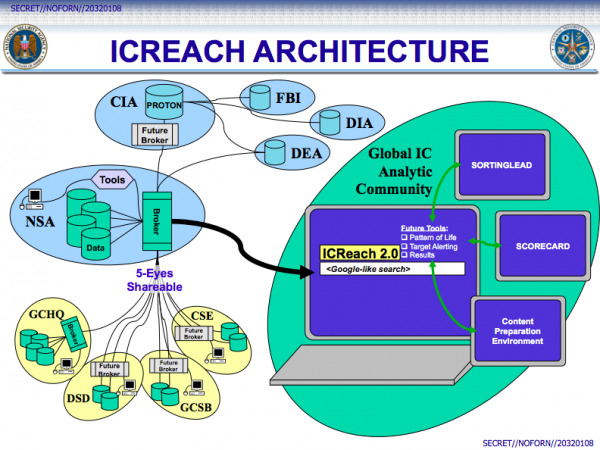NSA's ICREACH search engine gave info to foreign agencies
It seems the NSA didn't need a backdoor after all. A new report says the NSA, who have been found to be working on all sorts of intrusive electronic things, may have jumped the shark, internationally speaking. Called ICREACH, the NSA's search engine essentially kept a detailed log of information on us, and was available to a variety of agencies across the globe.
ICREACH is essentially a search engine for data the NSA and others may have gathered over the years. In the diagram below, you see that the NSA was distributing — or allowing access too — metadata about any and everyone they and other agencies had info about. They call the go-between service a "broker", and had several sub-brokers in place for the sharing of data.

First Look reports that the NSA had allowed over 1,000 agents at 23 agencies to check us out. The aim was to create a predictive engine on movement for those citizens the NSA or other agencies considered a risk. By analyzing the digital breadcrumbs we leave behind, like movement or communications, the NSA and wanted to head terrorists off at the pass.
The data ICREACH has access too is for the purpose of "foreign intelligence", meaning it was not to be used to watch over citizens in an agency's backyard. ICREACH is believed to be working separately from the NSA's massive data hauls (that's not confirmed, of course), meaning the FBI can't access info about you that the NSA has. Again, this speaks to the aim of ICREACH being for agencies to keep tabs on foreigners they believe are a risk to their country.

The sharing of data isn't concerning, but the method is. ICREACH doesn't ask for a court order to obtain info, and it doesn't seem as though an agency needs to provide any reason to access the database. Instead, it operates as a handshake deal — an agency could access the data, so long as they shared in kind.
Interestingly enough, it seems Keith Alexander — the now-retired NSA director who went on 60 Minutes to harangue that the NSA was only here to protect us all — was the mastermind of this. In 2006, he detailed the "vast, rich source of information" that would "allow unprecedented volumes of communications metadata to be shared and analyzed". By 2007, it was up and running.
For an extrapolated view of just what ICREACH is all about, we suggest you read First Look's report, which is sourced below.
Source: First Look
